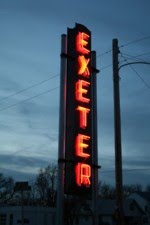Pages
- Home
- Exeter Village Ordinances - Chapter 1 Civil Admini...
- Exeter Village Ordinances: Municipal Planning
- Exeter Village Ordinances: Fire Regulations
- Exeter Village Ordinances: Public Utilities
- Exeter Village Ordninances: Public Ways and Proper...
- Exeter Village Ordinances: Business Regulations
- Exeter Village Ordinances: Vehicles and Traffic
- Exeter Village Ordinances: Misdemeanors
- Exeter Village Ordinances - Commissions and Boards...
- Stories from Exeter
- Photos from Exeter
- Exeter's Strategic Plan
- Exeter Community Guide
- Exeter Aquatic Center Rules
- Exeter Service Record Book World War I and II
VILLAGE OF EXETER
This blog is sponsored by the Village of Exeter and it is for all the past, present and future residents of Exeter. It is a place to comment on the happenings of Exeter and your place to inform the community
Sunday, May 26, 2013
Memorial Day: Remembering one of our own Fallen Hereoes, Arthur Becker
If you understand what a gold star banner in a window means, seeing one can almost bring tears to your eyes. Banners in the windows of families with members serving in a war zone became popular during World War I. A blue star indicates a member who is currently serving in a war zone, a silver star indicates that a family member has been wounded or injured in a war zone and the gold star means a family member died during service to their country.
Each year the Exeter American Legion Auxiliary honors two Gold Star family members, the family of Arthur Becker and the family of Kenneth McLeese.
Arthur Becker was killed while serving overseas during World War II. He was drafted into the Army on December 10, 1943 as part of the 1151 Engineers. He trained at Camp Abbott, Oregon, Camp Beale, California and Camp Van Dorn, Mississippi. He embarked to the European Theatre of Operations on November 1, 1944.
While overseas Arthur served on the line for a few months and then as a driver for a Colonel during the war and after, during the occupation. He crossed overseas on a boat where he experienced sea sickness according to the letters he sent home. He arrived in Scotland and then was sent to England.
Once he started driving for the Colonel (just a few months into his time overseas) he was away from his unit for weeks at a time. He was in France, Belgium, and Germany while driving for the Colonel.
While overseas he ran into Jerome Becker from Exeter and also served with a Mr. Beecher, from Omaha. Mr. Beecher named his son Arthur Paul to remember Arthur by.
He sent many letters home talking of the countries he saw, noting the beauty of Switzerland, “I will never forget how beautiful it was even if I live to be 300 years old,” he wrote.
He also talked often of his horses at home. In nearly every letter he mentioned his horse Smoky, always asking for a nice picture of him. He spoke often of horses with his fellow soldiers, even demonstrating his riding and breaking skills on a herd of wild horses while overseas.
When the war finally ended, Arthur chose to remain overseas retaining his job as a driver for the Colonel (who was known to be difficult to get along, Arthur being one of the few that could work with the “Ole Boy”). After Arthur’s death one of his friends, Raymond McClure wrote to the Becker’s, “Driving for the Colonel was one job that no one could handle except Arthur.”
Arthur was able to see many sights during his furlough’s, but some of the things he was privileged to see were due to touring with the Colonel. He wrote of going into an airplane part manufacturing plant in Germany that was built into a mountain in tunnels underground. He wrote that some of the machinery still had incomplete parts like they had just been left in a hurry. Most of the workers in the plant had been slave laborers.
Arthur’s Colonel left the occupation zone to go home but Arthur continued to drive for a different Colonel. He was driving in a convoy of five vehicles on their way to Belgium when he tragically lost his life. He was in the first truck but was asked to trade places with the Colonel who was in the rear vehicle because the Colonel had the map. After traveling a short distance, the truck Arthur was riding in hit a patch of ice causing it to upset with Arthur being crushed underneath. No one else was injured in the accident.
The accident happened on December 15, 1945, but Arthur’s family was not notified of his death until December 28th. The family held a memorial service for him January 22, 1946 in Exeter. At the time of his death he was buried in Belgium but his family was given a month to decide if they wanted his body exhumed and returned. His sisters, Jane Kaiser and Cenie Sackschewsky, recalled that their parents decided to have his body returned because “If it wasn’t Art, we were taking care of someone else’s son.”
The family had another service in September of 1948 when his body was returned. His sisters recalled a large crowd meeting the train that carried Arthur’s body home.
Arthur was buried in the Exeter cemetery and is remembered often by his family and recognized each Memorial Day for the ultimate sacrifice he made in serving his country.
Subscribe to:
Post Comments (Atom)



No comments:
Post a Comment